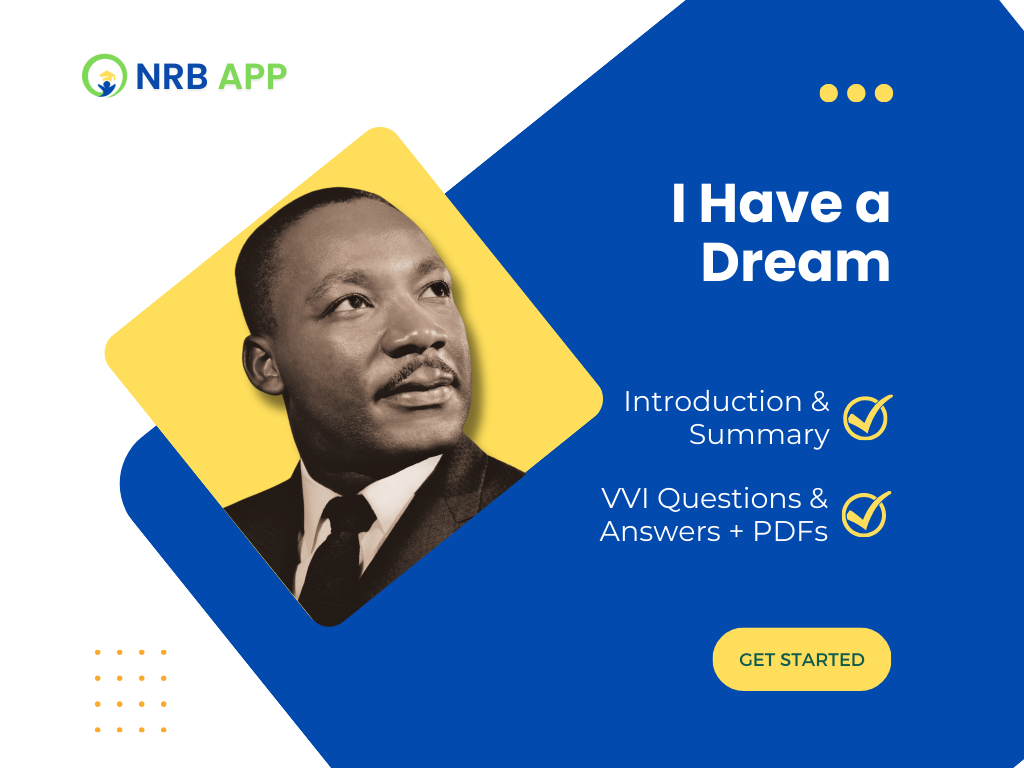i have a dream vvi questions
Bihar Board Class 12 English Chapter 4: I Have a Dream introduces one of the most famous speeches in history, Dr. Martin Luther King Jr.’s I Have a Dream. This powerful speech, delivered in 1963 during the March on Washington, symbolizes the fight for racial equality and justice. In this article, we will break down the chapter, explain its key points, and provide a free PDF download of the summary, Subjective, Objective for easy reference.
“I Have a Dream” is a speech delivered by Martin Luther King, Jr on the steps of the Lincoln Memorial in Washington DC on August 28, 1963. Here he speaks about his dream of seeing America as a developed country. He wants his country free from the racial distinction between the whites and the black. The speech brings a great change in the country. King himself was established as one of the greatest orators of the world. In his speech, he requests his audience to maintain peace and conduct their movement with dignity. He reminds the authority of his promises that were made one hundred years ago. He parents the poor and bad condition of the negro slaves. They live in slums and ghettos. They are deprived of their right to vote. They are cruelly treated by the police. They have lost all hope of life. He demands that they must be now provided with their rights if America wants to be a great nation. Lastly, he says that there will be freedom and justice everywhere. Incoming generations will not be judged by the colour of their skin but by the context of their character. There is hope for a transformed situation where all black people will be able to join hands with all the white people and walk.
1. Who is the author of the prose piece “I Have a Dream”?.
(A) Martin Martini
(B) Martin Luther King
(C) Shiga Naoya
(D) H.E. Bates | Ans- (B)
2. I Have a Dream” is a part of a speech delivered by ………
(A) Germaine Greer
(B) Shiga Naoya
(C) H.E. Bates
(D) Martin Luther King, Jr. | Ans- (D)
3. Martin Luther King Jr. belonged to ……
(A) The USA
(B) Britain
(C) Germany
(D) France | Ans- (A)
4. Let freedom ring from the stone mountain of ……….
(A) Georgia
(B) Alabama
(C) Colorado
(D) Tennessee | Ans- (A)
5.The pledge is to always go ahead on the path of ………
(A) Hills
(B) Success
(C) Freedom
(D) Love | Ans- (C)
6. Who was influenced by Gandhiji?
(A) Martin Luther King, Jr.
(B) Dr Zakin Hussain
(C) Shiga Naoya
(D) H.E. Bates | Ans- (A)
7. Who was one of the greatest orators in American history?
(A) Martin Luther King, Jr.
(B) Dr Zakir Hussain
(C) Bertrand Russell
(D) H. E. Bates | Ans- (A)
8. Nineteen …………. is not an end, but a beginning
(A) caste
(B) sex
(C) religion
(D) racial | Ans- (D)
9. I was waiting on the ……….. when the train comes in.
(A) sixty-three
(B) sixty-two
(C) sixty-one
(D) sixty | Ans- (A)
10. Martin Luther King advocates non-violence means ……
(A) struggle
(B) fight
(C) revolution
(D) None of these | Ans- (A)
11. The life of Negro is ……..
(A) very pleasant
(B) most adventurous
(C) sadly crippled by the manacles of segregation
(D) full of mysteries | Ans- (C)
12.One hundred years later the life of the Negro is ………..
(A) free from cares and anxieties
(B) chains of discrimination
(C) prosperous
(D) full independent | Ans- (B)
13.The Montgomery story” is written by …….
(A) Bertrand Russell
(B) Shiga Naoya
(C) Martin Luther King, Jr.
(D) Dr Zakir Hussain | Ans- (C)
1. What is the author trying to achieve through his speech?
Ans- Martin Luther seeks the support of the audience in his struggle for the rights of the Negros. Even some whites were present there. He expresses his gratitude to those who came to listen to him and support the Negro’s cause.
2. Do you think Martin Luther is a great orator? What, according to you, are qualities of a great orator?
Ans- Yes, I sincerely believe that Martin Luther is a great orator. In my opinion, a great orator is one who can draw the attention of the readers, spellbinds them and succeeds in conveying his message.
3.What does Martin Luther urge his people to do?
Ans- Martin Luther king asks the Negroes to follow the path of non-violence. He asks them to be patient, courageous and cultivate the power of the soul of counter physical voilence.
4. What are the ‘trials and tribulations’ the author talks about.
Ans- Martin Luther talks about the trials and tribulation face by the Negros in jails where they had to face creative sufferings. He talks about the suffering caused by their segregation.
